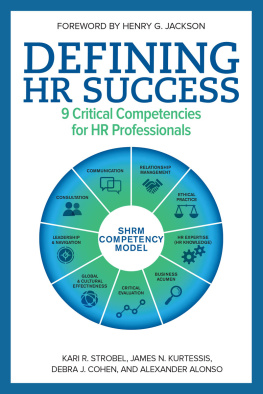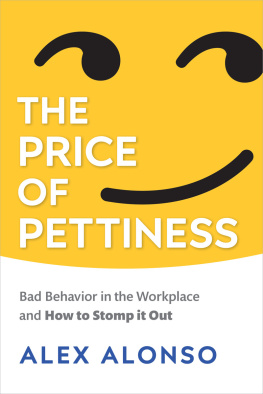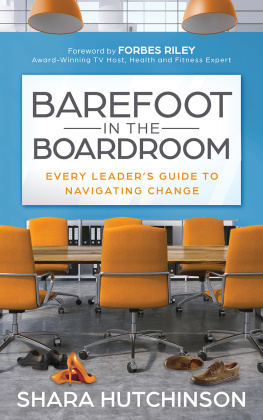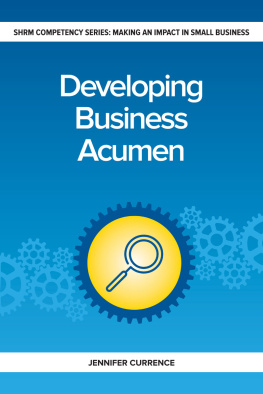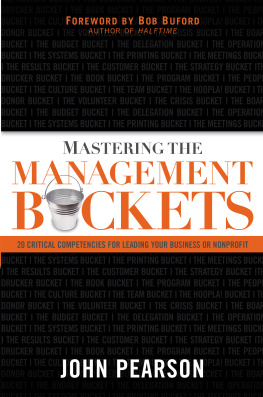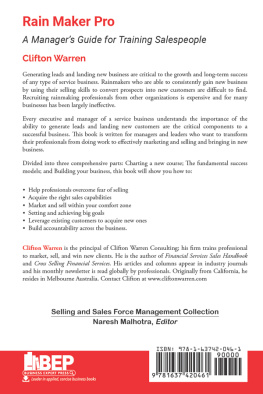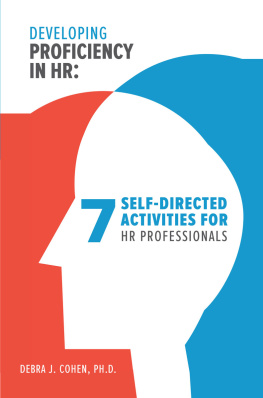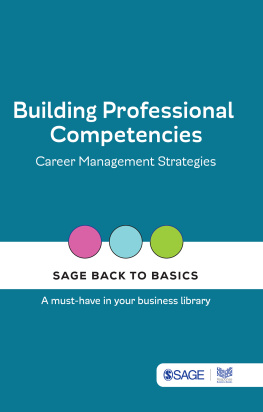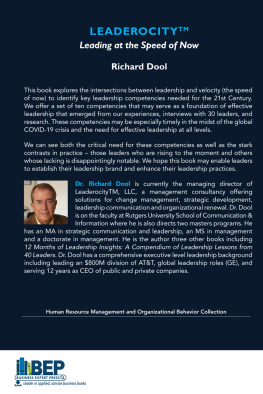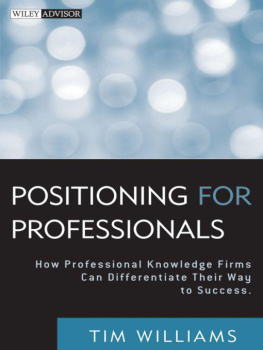
This publication is designed to provide accurate and authoritative information regarding the subject matter covered. It is sold with the understanding that neither the publisher nor the author is engaged in rendering legal or other professional service. If legal advice or other expert assistance is required, the services of a competent, licensed professional should be sought. The federal and state laws discussed in this book are subject to frequent revision and interpretation by amendments or judicial revisions that may significantly affect employer or employee rights and obligations. Readers are encouraged to seek legal counsel regarding specific policies and practices in their organizations.
This book is published by the Society for Human Resource Management (SHRM). The interpretations, conclusions, and recommendations in this book are those of the authors and do not necessarily represent those of the publisher.
Copyright 2015 Society for Human Resource Management. All rights reserved.
This publication may not be reproduced, stored in a retrieval system, or transmitted in whole or in part, in any form or by any means, electronic, mechanical, photocopying, recording, or otherwise, without the prior written permission of the Society for Human Resource Management, 1800 Duke Street, Alexandria, Virginia 22314.
Founded in 1948, the Society for Human Resource Management (SHRM) is the worlds largest HR membership organization devoted to human resource management. Representing more than 275,000 members in over 160 countries, the Society is the leading provider of resources to serve the needs of HR professionals and advance the professional practice of human resource management. SHRM has more than 575 affiliated chapters within the United States and subsidiary offices in China, India, and United Arab Emirates. Visit SHRM Online at www.shrm.org.
Interior and Cover Design: Shirley E.M. Raybuck
Library of Congress Cataloging-in-Publication Data
Strobel, Kari R.
Defining HR success : 9 critical competencies for HR professionals / Kari R. Strobel, James N. Kurtessis, Deb Cohen, and Alexander Alonso.
pages cm
Includes bibliographical references and index.
ISBN 978-1-58644-382-5
1. Personnel management. I. Title.
HF5549.S89426 2015
658.3--dc23
2015009792
15-0048
Contents
Foreword
Human resource management, as a profession, is relatively young. It was just over 60 years ago that management guru Peter Drucker published The Practice of Managementand first used the term human resources. Since that time, HR has seen substantial change, evolving from a primarily administrative to the strategic business function it is today.
Yet one of our professions most persistent challenges has been fully articulating what is required to succeed in and deliver great HR.
We knew it when we saw it. We could point to exemplary HR professionals who were business-savvy, well-respected and leading their organizations strategy. They had meaningful relationships with people at every rung of the corporate ladder. They were seen as trusted advisors to the C-suite and the board. They had acquired the leadership mantle reflective of the role human resources plays in the success of organizations. We lifted these individuals up as examples of great HR and where HR needed to go.
But simply knowing where HR needs to go is insufficient. To get there expeditiously, we need a roadmap that details how to get there and that defines HR success for professionals at every stage of their careers.
SHRM has done that in the SHRM Competency Model. We surveyed businesses, educators, and over 32,000 HR professionals to identify the nine critical behavioral and leadership competencies every HR professional needs to succeed and grow. Among the key competencies youll find in this book are business acumen, leadership and navigation, global and cultural effectiveness and of course HR expertise.
These competencies are relevant at every career stage, across all industries, and around the world. They are the behaviors businesses require from modern HR professionals. They are also the competencies demonstrated by the most successful members of the HR profession.
In Defining HR Success, you will find information that will help you respond to the new, higher expectations of HR and advance your career to the level business demands. You will find a roadmap to becoming the HR business leader you aspire to be, and to achieving the positive results your organizations needs from HR.
SHRM believes that people are the most critical lever of success in todays fast-paced business environment. We believe that HR must continue to evolve, to lead and drive impact in our organizations. Most important, SHRM believes in you.
Henry G. Hank Jackson
President & CEO, SHRM
Acknowledgements
The authors would like to thank the following for their contributions in elevating the HR profession:
Steve Bates
Brad Boyson
Tharanga Fonseka
David Geller
Lindsay Northon
Mark J. Schmit
Rachel Tenenbaum
Your contributions helped make our research better and helped us achieve new heights for defining success in HR.
For the HR profession your insights represent the most wonderful window into the business world and we are grateful youve shared them with us.
For the Society for Human Resource Management thank you for taking the bold initiative to advance the profession and for being a true thought leader for today and for tomorrows HR.
Part I:
Overview and Introduction
The HR profession has been under attack for decadesfrom Why We Hate HR in Fast Company to Its Time to Split HR in Harvard Business Review.a successful HR practitioner, identifying the critical competencies HR professionals need to solve our most pressing talent issues of today and to deliver HR strategy to enable businesses to evolve into the future.
Chapter 1.
The History of Competency Modeling
To understand the value of the SHRM Competency Model, a brief overview of the history of competency modeling will help set the context for the development of the SHRM model and provide you with a greater understanding of the models value to you as an HR practitioner and to the HR profession.
What are competencies, and what are competency models?
In a foundational review of competency models, Jeffery S. Shippmann and his colleagues, as delineated by the Society for Industrial and Organizational Psychology (SIOP) taskforce on competency modeling and explored further by Michael Campion and his colleagues, noted a great deal of variability in how competencies are defined, often depending on the professional field of interest and the context of the discussion. When conducting research on the HR profession, SHRM defines a competency as a collection of knowledge, skills, abilities, and other characteristics (KSAOs) that contribute to individual and organizational performance.
A competency model is a set of related competencies linked together that describe the requisite attributes (that is, KSAOs) for successful job performance in a given domain, such as human resources. Competency models include a set of specific behavioral statements that define the competencies and describe what the job-related behavior for each competency looks like. Competencies can be either technical (or functional, capturing the what of the job that is being performed) or they can be behavioral (capturing
Next page
